Values
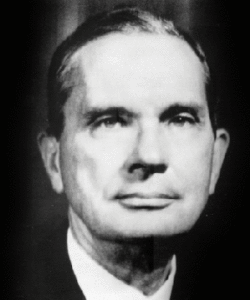 During their reign of terror, Japan, like Germany had their sights set on world domination. Japanese troops landed in Hong Kong on December 18, 1941, and an immediate slaughter began. The process started with a week of air raids over Hong Kong, which was a British Crown Colony at the time. Then on December 17, Japanese envoys paid a visit to Sir Mark Young, who was at that time, the British governor of Hong Kong.
During their reign of terror, Japan, like Germany had their sights set on world domination. Japanese troops landed in Hong Kong on December 18, 1941, and an immediate slaughter began. The process started with a week of air raids over Hong Kong, which was a British Crown Colony at the time. Then on December 17, Japanese envoys paid a visit to Sir Mark Young, who was at that time, the British governor of Hong Kong.
The envoys’ message was simple: “The British garrison there should simply surrender to the Japanese—resistance was futile.” The envoys were sent home with the following retort: “The governor and commander in chief of Hong Kong declines absolutely to enter into negotiations for the surrender of Hong Kong…”
The unsuccessful negotiations brought a swift wave of Japanese troops, who in retaliation for the refused surrender, landed in Hong Kong with artillery fire for cover and the following order from their commander: “Take no prisoners.” The troops quickly overran a volunteer antiaircraft battery, and the Japanese invaders roped together the captured soldiers. In a complete disregard for human life, a complete disregard for the Geneva Convention rules, or any rules of common decency, the Japanese proceeded to bayonet them to death. Even those who offered no 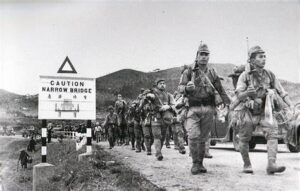 resistance, such as the Royal Medical Corps, were led up a hill and killed. They showed no mercy, just hate and evil. Following the initial slaughter, the Japanese took control of key reservoirs. With the water under their control, they threatened the British and Chinese inhabitants with a slow death by thirst. With their backs against a wall, the British finally surrendered control of Hong Kong on Christmas Day.
resistance, such as the Royal Medical Corps, were led up a hill and killed. They showed no mercy, just hate and evil. Following the initial slaughter, the Japanese took control of key reservoirs. With the water under their control, they threatened the British and Chinese inhabitants with a slow death by thirst. With their backs against a wall, the British finally surrendered control of Hong Kong on Christmas Day.
On that same day, the War Powers Act was passed by Congress, authorizing the president to initiate and terminate defense contracts, reconfigure government agencies for wartime priorities, and regulate the freezing of foreign assets. It also permitted him to censor all communications coming in and leaving the country. President Franklin D Roosevelt appointed the executive news director of the Associated Press, Byron Price, as director of censorship. Although invested with the awesome power to restrict and withhold news, Price took no extreme measures, allowing news outlets and radio stations to self-censor, which they did. Most top-secret information, including the construction of the atom 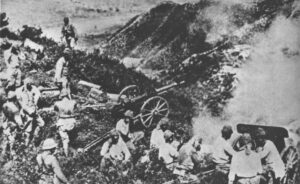 bomb, remained just that…strangely, but then those were different times.
bomb, remained just that…strangely, but then those were different times.
“The most extreme use of the censorship law seems to have been the restriction of the free flow of “girlie” magazines to servicemen…including Esquire, which the Post Office considered obscene for its occasional saucy cartoons and pinups. Esquire took the Post Office to court, and after three years the Supreme Court ultimately sided with the magazine.” It amazes me just how much times have changed. These days the “girlie” trash is totally acceptable, but truth is censored and lies are allowed. Too bad we are so far out from those days.
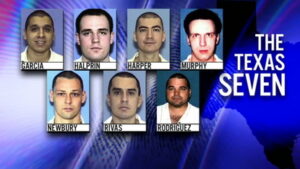 Maybe they were just wanting to be home for Christmas, and not knowing exactly how long it would take…while hiding out from the law, that is…the Texas Seven decided to get a jump start on the journey. No, probably not. It wasn’t Christmas with loved ones that was on their minds…it was freedom. On December 13, 2000, seven prisoners dubbed the “Texas Seven” by the media, broke out of maximum-security prison in South Texas, setting off a massive six-week manhunt. The prisoners were Joseph Christopher Garcia, Randy Ethan Halprin, Larry James Harper, Patrick Henry Murphy Jr, Donald Keith Newbury, George Angel Rivas Jr, and Michael Anthony Rodriguez. The escapees overpowered civilian employees and prison guards in the maintenance shop where they worked and stole clothing, guns, and a vehicle. The men left a note saying: “You haven’t heard the last of us yet,” and they were right. These men were convicted of crimes like murder, rape, and robbery. They were set to be executed soon, so they had nothing to lose.
Maybe they were just wanting to be home for Christmas, and not knowing exactly how long it would take…while hiding out from the law, that is…the Texas Seven decided to get a jump start on the journey. No, probably not. It wasn’t Christmas with loved ones that was on their minds…it was freedom. On December 13, 2000, seven prisoners dubbed the “Texas Seven” by the media, broke out of maximum-security prison in South Texas, setting off a massive six-week manhunt. The prisoners were Joseph Christopher Garcia, Randy Ethan Halprin, Larry James Harper, Patrick Henry Murphy Jr, Donald Keith Newbury, George Angel Rivas Jr, and Michael Anthony Rodriguez. The escapees overpowered civilian employees and prison guards in the maintenance shop where they worked and stole clothing, guns, and a vehicle. The men left a note saying: “You haven’t heard the last of us yet,” and they were right. These men were convicted of crimes like murder, rape, and robbery. They were set to be executed soon, so they had nothing to lose.
These were not the kind of people that anyone wanted to have running around the state…or anywhere outside of prison walls. Soon after escaping from the Connally Unit lockup in Kenedy, Texas, the fugitives picked up another getaway vehicle. This one provided by the father of one of the men. They robbed a Radio Shack store in Pearland, Texas, coming out with cash and police scanners. On Christmas Eve, the escapees struck a sporting-goods store in Irving, Texas, where they stole a large amount of cash and weapons. In the process, the men killed police officer Aubrey Hawkins, shooting him multiple times with multiple weapons and running him over. Now they really had nothing to lose. Now, they were cop killers on top of everything else. It looked like it was time to get out of Dodge…or in this case, Texas.
The Texas Seven headed to Colorado, where they purchased a motor home and told people they were Christian missionaries. They rented a spot at a trailer park near Woodland Park, Colorado. They were there about a month before things started to fall apart. On January 22, 2001, after seeing the “Texas Seven” profiled on the TV program America’s Most Wanted, someone tipped off the police to the group of seven “missionaries” near Woodland Park. During the raid, ringleader George Rivas was captured along with three of the other men. Larry James Harper decided that he was not going back to prison, so he committed suicide after being surrounded by  police. Two days later, law enforcement officials closed in on the two remaining escapees at a hotel in Colorado Springs. A standoff ensued, during which the fugitives conducted phone interviews with a TV news station and claimed their escape was a protest against Texas’ criminal justice system. Someone always has to add a bit of drama to justify their new crimes. There was no evidence indicating their claim was justified. The men then surrendered to authorities. Their crime spree was over. Of the six remaining, four have since been executed. Randy Ethan Halprin and Patrick Henry Murphy Jr are currently back at Polunsky Unit in Livingston, Texas on Death Row awaiting execution.
police. Two days later, law enforcement officials closed in on the two remaining escapees at a hotel in Colorado Springs. A standoff ensued, during which the fugitives conducted phone interviews with a TV news station and claimed their escape was a protest against Texas’ criminal justice system. Someone always has to add a bit of drama to justify their new crimes. There was no evidence indicating their claim was justified. The men then surrendered to authorities. Their crime spree was over. Of the six remaining, four have since been executed. Randy Ethan Halprin and Patrick Henry Murphy Jr are currently back at Polunsky Unit in Livingston, Texas on Death Row awaiting execution.
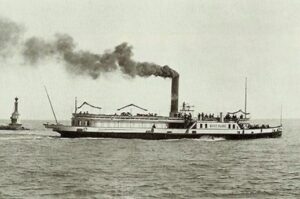 Disaster was eminent that December 6, 1917, and indeed, the disaster had already begun, but it was very likely to get far worse. Vincent Coleman and his co-worker, Chief Clerk William Lovett were working at the Richmond station where they received word that there was a crash between the French munitions ship, SS Mont-Blanc, and a Norwegian ship, SS Imo. A collision, in and of itself, would not have been any more serious than any other collision, except that the French munitions ship, was carrying a deadly cargo of high explosives. The likelihood of an explosion was the eminent disaster that was waiting to happen.
Disaster was eminent that December 6, 1917, and indeed, the disaster had already begun, but it was very likely to get far worse. Vincent Coleman and his co-worker, Chief Clerk William Lovett were working at the Richmond station where they received word that there was a crash between the French munitions ship, SS Mont-Blanc, and a Norwegian ship, SS Imo. A collision, in and of itself, would not have been any more serious than any other collision, except that the French munitions ship, was carrying a deadly cargo of high explosives. The likelihood of an explosion was the eminent disaster that was waiting to happen.
That day, in what was called the Halifax Explosion, Coleman is remembered as one of the heroic figures, because of his quick-thinking message to an oncoming train to stop and remain out of range before the explosion. Coleman knew what was coming, and he saved many lives as a result of holding back that train. born on March 13th, 1872, was a train dispatcher for the Canadian Government  Railways. Moments after the collision, the SS Mont-Blanc caught fire and the crew abandoned the ship. Now it was up to Vincent, trying to hold back a sense of panic, to figure out what trains were going to be coming into Halifax. He knew they had to be warned.
Railways. Moments after the collision, the SS Mont-Blanc caught fire and the crew abandoned the ship. Now it was up to Vincent, trying to hold back a sense of panic, to figure out what trains were going to be coming into Halifax. He knew they had to be warned.
Part of the reason for such a panicked state was that the French ship had drifted from the middle of the channel to the pier. While still burning, she beached herself on the shore in a matter of minutes. The captain warned Coleman of the deadly cargo on the ship, and Coleman flew into action. He immediately sent a telegraph to the Number 10 overnight express train that was coming in from Saint John, New Brunswick, carrying over 300 passengers, telling them to stop where they were and remain there until further notice, thereby saving the lives of passengers and crew. Then, Lovett and Coleman quickly evacuated their station, but Coleman couldn’t stay 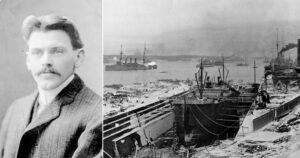 away. There was too much danger. Coleman returned to the station and continued to warn trains all the way to Truro in order to stop them from any closer to the scene. Coleman’s morse was code message was this: “Hold up the train. Ammunition ship afire in harbor making for Pier 6 and will explode. Guess this will be my last message. Good-bye boys.” While Coleman’s message stopped the Number 10 train, saving the lives of 300 people, and also likely saved other lives with his warnings to stay back, he lost his own life in the endeavor when the ship exploded. Staying at the station was a courageous act that cost Coleman his life.
away. There was too much danger. Coleman returned to the station and continued to warn trains all the way to Truro in order to stop them from any closer to the scene. Coleman’s morse was code message was this: “Hold up the train. Ammunition ship afire in harbor making for Pier 6 and will explode. Guess this will be my last message. Good-bye boys.” While Coleman’s message stopped the Number 10 train, saving the lives of 300 people, and also likely saved other lives with his warnings to stay back, he lost his own life in the endeavor when the ship exploded. Staying at the station was a courageous act that cost Coleman his life.

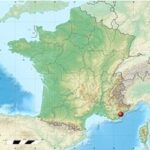 A strange thought, indeed, but Posthumous Marriage is not illegal in France…at least not since the Malpasset Dam disaster of December 2, 1959. While most of us would consider Posthumous Marriage to be a rather morbid idea, there are a couple of reasons that are considered legitimate reasons for the request for such a marriage to be granted. One such reason is, of course, a matter of deep emotional feelings for the lost fiancé. Another reason is to legitimize any children the couple already had, prior to the marriage…which I guess I can see, to a degree. There are rules that must be followed in order to have such a marriage approved…no matter what the reasons. The living partner must ask the deceased partner’s family for permission, and the invitations to the wedding must have already been sent out (showing intent from both members of the couple). The family can choose to allow, or not to allow the marriage, and if they do not agree, it is over. If family approval is given, the living partner must go before a judge to get legal permission to “marry” the deceased partner…who is usually represented at the service with a photograph. And…there are things that do not come with the marriage, such as any of the deceased partner’s property or money. In all reality, it is simply a symbolic event declaring their love for their partner. Nothing more!!
A strange thought, indeed, but Posthumous Marriage is not illegal in France…at least not since the Malpasset Dam disaster of December 2, 1959. While most of us would consider Posthumous Marriage to be a rather morbid idea, there are a couple of reasons that are considered legitimate reasons for the request for such a marriage to be granted. One such reason is, of course, a matter of deep emotional feelings for the lost fiancé. Another reason is to legitimize any children the couple already had, prior to the marriage…which I guess I can see, to a degree. There are rules that must be followed in order to have such a marriage approved…no matter what the reasons. The living partner must ask the deceased partner’s family for permission, and the invitations to the wedding must have already been sent out (showing intent from both members of the couple). The family can choose to allow, or not to allow the marriage, and if they do not agree, it is over. If family approval is given, the living partner must go before a judge to get legal permission to “marry” the deceased partner…who is usually represented at the service with a photograph. And…there are things that do not come with the marriage, such as any of the deceased partner’s property or money. In all reality, it is simply a symbolic event declaring their love for their partner. Nothing more!!
So how did such a strange idea get started in the first place. On December 2, 1959, the Malpasset Dam, an arch dam on the Reyran River, which is located approximately 4 miles north of Fréjus on the French Riviera (Côte d’Azur), Southern France, in the Var department collapsed, killing 423 people in the resulting flood. Signs of an imminent collapse began in November 1959, when a “trickle of clear water observed high on the right [side]” and then cracks noticed later in the month in the concrete apron at the dam toe. The dam was breached at 9:13pm on December 2, 1959. The break was partially due to rainfall and thus the rising level of water. By noon that day, the reservoir had reached its maximum level, and the guardian André Ferro asked for permission to release the excess water, but was denied the ability to do so until 6:00pm of that day. By then, the amount of water was so high that it took three hours to release only a few centimeters of water. The entire wall then collapsed leaving only a few blocks on the right bank. Pieces of the dam are still scattered throughout the area to this day. The damage amounted to an equivalent total of 68 million US dollars.

Apparently, there were so many women who lost their fiancés, that the event also ushered in the practice of posthumous marriage in France. It’s hard for me to imagine that out of 423 people, there were enough fiancés to warrant the need for a new law. I could assume that at least some of those couples were…dating yes, but not planning their weddings. Remember, that the invitations had to have been sent out, so there were a lot of couples in varying stages of wedding planning. Still, posthumous marriage is a very strange idea.
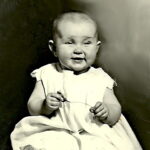
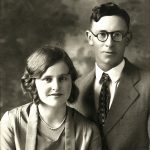 For a while now, in my Bible study, I have been studying about Jesus as the good shepherd. While that may not really remind most people in our family of my husband’s grandpa, Robert Knox, it does remind me of him. Jesus’ stories about how a good shepherd would do what it takes to keep his flock of sheep safe, are really true of any “good” shepherd. The whole job of a shepherd is to fight off the coyote, mountain lion, bear, or any other predator that might harm or even kill the sheep. In Biblical times, and maybe even to this day, the shepherd is often the only one with the sheep, because as we all know, sheep are a fairly docile animal. Predators…however, are definitely not docile. They are ravenously hungry, and you, the shepherd, are the only thing that lies between them and their next meal. That puts you, the shepherd…in the way.
For a while now, in my Bible study, I have been studying about Jesus as the good shepherd. While that may not really remind most people in our family of my husband’s grandpa, Robert Knox, it does remind me of him. Jesus’ stories about how a good shepherd would do what it takes to keep his flock of sheep safe, are really true of any “good” shepherd. The whole job of a shepherd is to fight off the coyote, mountain lion, bear, or any other predator that might harm or even kill the sheep. In Biblical times, and maybe even to this day, the shepherd is often the only one with the sheep, because as we all know, sheep are a fairly docile animal. Predators…however, are definitely not docile. They are ravenously hungry, and you, the shepherd, are the only thing that lies between them and their next meal. That puts you, the shepherd…in the way.
At this point, you might be wondering how that applies to Grandpa Knox, but it does. Grandpa was a shepherd for a time in his working days, and he had an even bigger reason to keep predators away from his flock. While many shepherds were along with their flock, Grandpa was not. He had his wife, Nettie and their three-year-old daughter, Joann Knox (Schulenberg) with him, and it was his most important job to keep them safe. I can’t say that he ever wrestled a coyote, mountain lion, or bear, but it’s possible that he had to kill a few with a gun.
Grandpa Knox did not really seem the type to be a mighty hunter or killer of predators, but I suppose he would 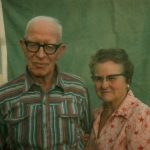
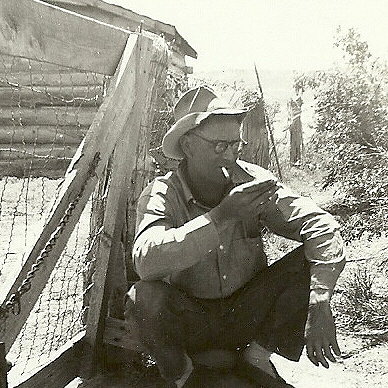 have had to become that in the event of a situation. The Grandpa Knox I met when I joined this family was more the gardener type. Grandpa spent much of his summer hours tending the garden on my in-laws place that provided our family with lots of great vegetables. I thought that the biggest predator Grandpa handled was a stray cow or maybe a hungry bunny rabbit. I suppose he did handle those too, but once upon a time, he protected the sheep in his flock, just like the stories Jesus told us about the shepherd and the predator. Today is the 113th anniversary of Grandpa Knox’s birth. Happy birthday in Heaven, Grandpa Knox!! We love and miss you very much!!
have had to become that in the event of a situation. The Grandpa Knox I met when I joined this family was more the gardener type. Grandpa spent much of his summer hours tending the garden on my in-laws place that provided our family with lots of great vegetables. I thought that the biggest predator Grandpa handled was a stray cow or maybe a hungry bunny rabbit. I suppose he did handle those too, but once upon a time, he protected the sheep in his flock, just like the stories Jesus told us about the shepherd and the predator. Today is the 113th anniversary of Grandpa Knox’s birth. Happy birthday in Heaven, Grandpa Knox!! We love and miss you very much!!
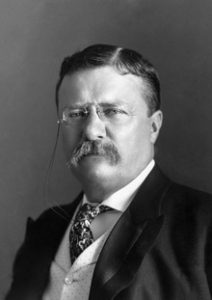
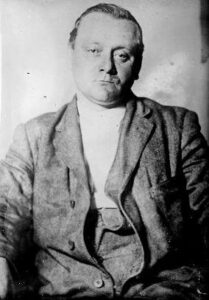 I have always known that I was stubborn, and “bull headed” and if you ask my sisters, they will very much agree with me on that fact, but I seriously doubt if they would ever call me stubborn if I were compared to President Theodore Roosevelt. I don’t think many people are as stubborn as Roosevelt was. Roosevelt didn’t run for his initial term in office, but rather became president of the United States because William McKinley was assassinated while Roosevelt was serving as vice president. He did run for and win a second term in the election of 1904, during which he promised not to run for a third term thereafter. A man of his word to a point, Roosevelt stuck to that promise through the 1908 election, but then he decided to run for President again in 1912, first losing the Republican primary to the incumbent William Taft and then running at the head of a brand-new party, the Progressive “Bull Moose” Party. It is a strange name for a political party, but I think it might have been appropriate for Roosevelt.
I have always known that I was stubborn, and “bull headed” and if you ask my sisters, they will very much agree with me on that fact, but I seriously doubt if they would ever call me stubborn if I were compared to President Theodore Roosevelt. I don’t think many people are as stubborn as Roosevelt was. Roosevelt didn’t run for his initial term in office, but rather became president of the United States because William McKinley was assassinated while Roosevelt was serving as vice president. He did run for and win a second term in the election of 1904, during which he promised not to run for a third term thereafter. A man of his word to a point, Roosevelt stuck to that promise through the 1908 election, but then he decided to run for President again in 1912, first losing the Republican primary to the incumbent William Taft and then running at the head of a brand-new party, the Progressive “Bull Moose” Party. It is a strange name for a political party, but I think it might have been appropriate for Roosevelt.
When Roosevelt decided to run for president again in 1912, a saloon owner named John Schrank became obsessed with him, and after having a nightmare that convinced Schrank that Roosevelt was responsible for McKinley’s assassination. That fueled his obsession, and on October 14, 1912, he walked up to Roosevelt as he exited a Milwaukee hotel on route to a campaign event and fired a .38-caliber revolver right into his chest. For most people, this would be the end of the story, but this is where Roosevelt really earned the name attached to the political party of which he was a member.
Unfortunately, Schrank was not a bad shot, and the bullet hit its mark. Fortunately, the path of the bullet was not an easy one. After passing through Roosevelt’s glasses case and 50 pages worth of notes in his breast pocket, which slowed it down considerably the bullet hit Roosevelt’s chest. The items in its way likely slowed the bullet enough to save Roosevelt’s life. Then, in typical “bull headed” fashion, the former president coughed into his hands to check for blood, and upon finding none, continued on to the Milwaukee Auditorium, where he delivered an 84-minute speech that began with the following lines, “Friends, I shall ask you to be as quiet as possible. I don’t know whether you fully understand that I have just been shot; but it takes more than that to kill a Bull Moose. But fortunately, I had my manuscript, so you see I was going to make a long speech, and there is a bullet – there is where the bullet went through – and it probably saved me from it going into my heart. The bullet is in me now, so that I cannot make a very long speech, but I will try my best.”
The bullet stayed lodged in his ribs throughout the rest of his unsuccessful campaign, and until his passing in 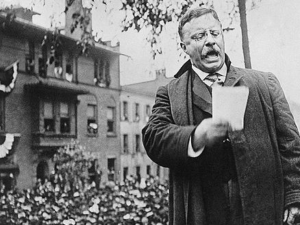
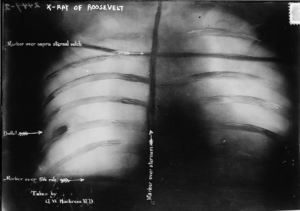 1919. While Roosevelt lost his race, his determination did show the kind of fortitude it takes to be president of this country. Being the leader of the free world, is not something that can be handled easily. The President of the United States must be an anointed position, and it is not one that just anyone can handle. In many ways, the best presidents are a type of “bull moose.” They have to be to take the pounding they have to take, and then keep coming back for more.
1919. While Roosevelt lost his race, his determination did show the kind of fortitude it takes to be president of this country. Being the leader of the free world, is not something that can be handled easily. The President of the United States must be an anointed position, and it is not one that just anyone can handle. In many ways, the best presidents are a type of “bull moose.” They have to be to take the pounding they have to take, and then keep coming back for more.
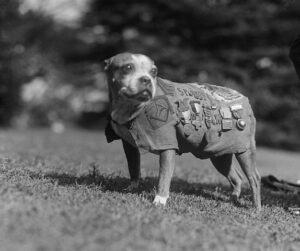 One day in 1917, a stray pit bull mix wandered onto the Yale University campus. Normally this would have meant a call to the local dog pound, but the dog rather attached himself to members of the 102nd Infantry Regiment, who were training at the school that day. While it was a bit unorthodox, the lost pup fit right in. He “volunteered” to participate in drills and quickly learned to salute with his right paw. He really seemed to want to enlist in the Army. The antics and intelligence of the dog quickly won the heart of Private James Robert Conroy, who decided to adopt the dog. He named the dog Stubby, because of his short, stubby tail. When it came time for the unit to ship out, Private Conroy couldn’t leave Stubby behind, so he smuggled him on board the troop ship. As they were getting off the ship in France, he hid Stubby under his overcoat…somehow without detection again. When Conroy’s commanding officer finally did discover Stubby, there might have been trouble, but Stubby saluted him, just as he had been trained to in camp, and the commanding officer couldn’t resist. He allowed the dog to stay on board.
One day in 1917, a stray pit bull mix wandered onto the Yale University campus. Normally this would have meant a call to the local dog pound, but the dog rather attached himself to members of the 102nd Infantry Regiment, who were training at the school that day. While it was a bit unorthodox, the lost pup fit right in. He “volunteered” to participate in drills and quickly learned to salute with his right paw. He really seemed to want to enlist in the Army. The antics and intelligence of the dog quickly won the heart of Private James Robert Conroy, who decided to adopt the dog. He named the dog Stubby, because of his short, stubby tail. When it came time for the unit to ship out, Private Conroy couldn’t leave Stubby behind, so he smuggled him on board the troop ship. As they were getting off the ship in France, he hid Stubby under his overcoat…somehow without detection again. When Conroy’s commanding officer finally did discover Stubby, there might have been trouble, but Stubby saluted him, just as he had been trained to in camp, and the commanding officer couldn’t resist. He allowed the dog to stay on board.
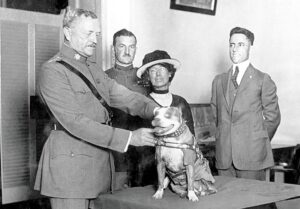
Stubby was a soldier all the way. He didn’t enlist to sit around and do nothing. While in France, in the trenches, Stubby was exposed to mustard gas. “Mustard gas or sulfur mustard is a chemical compound belonging to the sulfur-based family of cytotoxic and blister agent chemical warfare agents known as sulfur-mustards or mustard agents. The name mustard gas is widely used, but it is technically incorrect: the substance does not actually vaporize into a gas, but instead disperses as a fine mist of liquid droplets.” After Stubby recovered, he returned to the frontlines with his own specially-designed gas mask. The exposure to the mustard gas, combined with a dog’s heightened sense of smell, allowed Stubby to warn the 102nd of imminent poison gas attacks. Stubby also learned how to locate wounded soldiers during patrols, a very important part of his job. While technically a mascot, Stubby earned the rank of sergeant after he spotted a German spy and attacked the stunned man until reinforcements arrived. In his 18 months of service, Stubby participated in 17 battles, survived a series of wounds, and provided a much-needed boost to the morale of his fellow soldiers.
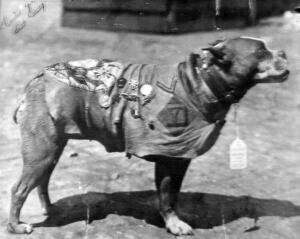
When World War I was over, Sergeant Stubby, as a decorated hero made his way back to the United States with Conroy. By this time, the dog now outranked his owner, and had become a national icon. Sergeant Stubby was invited to lead parades and was given awards until his death in 1926. Stubby died in his sleep on March 16, 1926. After his death he was preserved via taxidermy and his cremains were sealed inside of the mount. In 1956, Conroy decided to present Stubby to the Smithsonian. The taxidermy mount of the dog is part of the permanent collection at the Smithsonian National Museum of American History. It is currently on display in their “Price of Freedom: Americans at War” exhibit.
 Our Veterans…the cream of the crop. The strong and the brave. Those ones, with courage to last for days. We really cannot say enough about our brave fighting mem and women, who are willing to give up time with family and friends, to go out and fight, sometimes giving their lives so that other people…often unknown to them can live free. There should be a day to honor them. How could we not have such a day? It would be unthinkable. And so, today, we honor them. Those who served and came home again…some to face disability, PTSD, and sadness over the ones who didn’t make it home. We honor them, because they did what we were unable to do. While we sit at home, hopefully praying for our fighting men and women, they bravely took to the battleground, in the air, on land, and sea. Yes, not all served in wartime, but at any moment, all of them knew that it could become wartime.
Our Veterans…the cream of the crop. The strong and the brave. Those ones, with courage to last for days. We really cannot say enough about our brave fighting mem and women, who are willing to give up time with family and friends, to go out and fight, sometimes giving their lives so that other people…often unknown to them can live free. There should be a day to honor them. How could we not have such a day? It would be unthinkable. And so, today, we honor them. Those who served and came home again…some to face disability, PTSD, and sadness over the ones who didn’t make it home. We honor them, because they did what we were unable to do. While we sit at home, hopefully praying for our fighting men and women, they bravely took to the battleground, in the air, on land, and sea. Yes, not all served in wartime, but at any moment, all of them knew that it could become wartime.
I can’t say what it is that makes a soldier, because each probably has their own reasons for enlisting, but 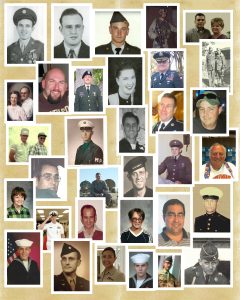 before they become a soldier, each has to make a decision that they will serve their country and willingly go wherever they are told, often without having a say in the matter. Some assignments are great, taking the soldier and family to exotic places, but some are so dangerous that the soldier cannot take his/her family along because it would be unsafe for them. Still, dangerous or not, the soldier bravely goes, and tries to be a credit to his/her uniform.
before they become a soldier, each has to make a decision that they will serve their country and willingly go wherever they are told, often without having a say in the matter. Some assignments are great, taking the soldier and family to exotic places, but some are so dangerous that the soldier cannot take his/her family along because it would be unsafe for them. Still, dangerous or not, the soldier bravely goes, and tries to be a credit to his/her uniform.
I am very proud of our veterans. They have served this country proudly. They took orders when they knew it could mean they lose their lives. That is a rare thing these days, when civil unrest is the norm. Many people would never consider a life or even an enlistment period, because they don’t think they would be appreciated. They don’t want to risk coming home only to be vilified, when in reality, they are the heroes. Veterans Day is a day to celebrate the soldiers who faced it all, and came back home to their families. To all of you…thank you for your service, and Happy Veterans Day!!
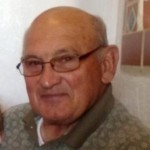 If your are from Forsyth, Montana, you most likely know our uncle, Butch Schulenberg. It’s not just because Forsyth is a small town of only 1495 people, so it is easy for everyone to know everyone else, but Butch Schulenberg is really special person within the Forsyth family. For one thing, he grew up the son of the local sheriff, and especially in a small town, that means everyone knows you, and might have even asked for you help when it came to matters of trouble with the sheriff. I doubt if his friends ever got into any real trouble, but kids will be kids. It’s just the way it is. I also doubt if Butch had a lot of pull when it came to getting his friends out of trouble, but then Sheriff Andy Schulenberg had a very different style when it came to policing the people of Rosebud County Montana. He didn’t even carry a gun, but that’s another story.
If your are from Forsyth, Montana, you most likely know our uncle, Butch Schulenberg. It’s not just because Forsyth is a small town of only 1495 people, so it is easy for everyone to know everyone else, but Butch Schulenberg is really special person within the Forsyth family. For one thing, he grew up the son of the local sheriff, and especially in a small town, that means everyone knows you, and might have even asked for you help when it came to matters of trouble with the sheriff. I doubt if his friends ever got into any real trouble, but kids will be kids. It’s just the way it is. I also doubt if Butch had a lot of pull when it came to getting his friends out of trouble, but then Sheriff Andy Schulenberg had a very different style when it came to policing the people of Rosebud County Montana. He didn’t even carry a gun, but that’s another story.
Uncle Butch grew up loving sports, and was a local sports hero. He still actively supports the local teams to this  day. It doesn’t matter to Butch, if it’s the boys teams, the girls teams, or the little league teams. They are his teams and he is a very loyal man. Knowing so many f the town’s people helps too, because he knows these kids personally. He has watched them grow up and cheered them on in every endeavor. You can’t beat the blessing of knowing all those great kids, and having them know you too. Butch never met a stranger, and calls everyone his friend. I like that, because while he is my husband, Bob Schulenberg’s uncle, he is mine too, by marriage. Nevertheless, I don’t even consider the “by marriage” part, because Butch Schulenberg is my uncle just as if I had been born into the family, and I love him very much. He even cheers me on
day. It doesn’t matter to Butch, if it’s the boys teams, the girls teams, or the little league teams. They are his teams and he is a very loyal man. Knowing so many f the town’s people helps too, because he knows these kids personally. He has watched them grow up and cheered them on in every endeavor. You can’t beat the blessing of knowing all those great kids, and having them know you too. Butch never met a stranger, and calls everyone his friend. I like that, because while he is my husband, Bob Schulenberg’s uncle, he is mine too, by marriage. Nevertheless, I don’t even consider the “by marriage” part, because Butch Schulenberg is my uncle just as if I had been born into the family, and I love him very much. He even cheers me on  in my writing endeavors, and that pleases me very much. Butch is like…everybody’s cheerleader. He loves to see people succeed and loves to cheer them on to that success.
in my writing endeavors, and that pleases me very much. Butch is like…everybody’s cheerleader. He loves to see people succeed and loves to cheer them on to that success.
Butch is also a proud husband, father, and grandfather. His kids, Tadd, Andi Kay, and Heath have 7 children between, and they all love their grandpa very much. Like the kids of Forsyth, Butch is one of his grandchildren’s biggest fans. He loves hearing about their activities and attends whenever he can. He tries very hard to be a hands-on grandpa, and they love him very much. Today is Uncle Butch’s 81st birthday. Happy birthday Uncle Butch. Have a great day!! We love you!!
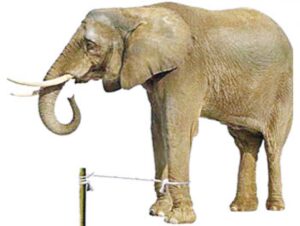
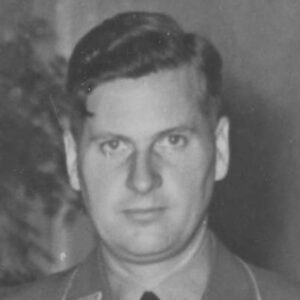 I read a story about training an elephant yesterday. It went like this, “As a man was passing the elephants, he suddenly stopped, confused by the fact that these huge creatures were being held by only a small rope tied to their front leg. No chains, no cages. It was obvious that the elephants could, at anytime, break away from their bonds but for some reason, they did not.
I read a story about training an elephant yesterday. It went like this, “As a man was passing the elephants, he suddenly stopped, confused by the fact that these huge creatures were being held by only a small rope tied to their front leg. No chains, no cages. It was obvious that the elephants could, at anytime, break away from their bonds but for some reason, they did not.
He saw a trainer nearby and asked why these animals just stood there and made no attempt to get away. ‘Well,’ trainer said, ‘when they are very young and much smaller we use the same size rope to tie them and, at that age, it’s enough to hold them. As they grow up, they are conditioned to believe they cannot break away. They believe the rope can still hold them, so they never try to break free.’
The man was amazed. These animals could at any time break free from their bonds, but because they believed they couldn’t, they were stuck right where they were.”
The story made me think about the way Hitler was able to train a generation to follow him without question. He took the children away from their parents when they were young, basically telling the parents that the state knew what was best for the children, and the parents didn’t know enough about educating the children to do a good job. He set up the Hitler Youth organization in 1933 for educating and training male youth in principles. Of course, the principles Hitler had in mind were vastly different from any that the parents could imagine. Hitler’s ideas included racism, killing any “undesirables” among the population, and controlling the people with curfews and lockdowns…to name a few. Under the leadership of Baldur Benedikt von Schirach, the head of all German youth programs, the Hitler Youth included by 1935 almost 60 percent of German boys. On July 1, 1936, it became a state agency that all young “Aryan” Germans were expected to join. Upon reaching his 10th birthday, a German boy was registered and investigated especially for “racial purity” and, if qualified, inducted into the “German Young People.” At age 13 the youth became eligible for the Hitler Youth, from which he was graduated at age 18. Throughout these years he lived a life of dedication, fellowship, and Nazi conformity, generally with minimum parental guidance. From age 18 he was a member of and served in the state labor service and the armed forces until at least the age of 21.
Two leagues also existed for girls. The League of German Girls trained girls ages 14 to 18 for comradeship, domestic duties, and motherhood. “Young Girls” was an organization for girls ages 10 to 14. The girls were expected to have babies to build the Reich…provided they qualified as “racially pure,” of course.
In the tumultuous days we currently live in, parents need to be very involved in what our children are being taught. The current racially charged climate in our nation would only be exacerbated by teaching our children things like Critical Race Theory, because it is really the new Ku Klux Klan. Racism, against any nationality is simply wrong…there is no gray area. Our children need to be able to be proud of the race they are and the background they come from. Racism is unacceptable, against any race, and we, as parents, grandparents, and 
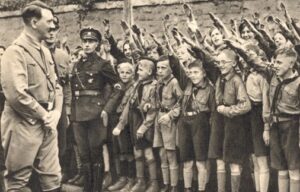 even great grandparents, need to kick the government out of our educational system, and get back to decent moral values. We need to stop the insanity in our schools, and teach our kids the true history of our nation. We must teach good values, and our children need to be taught to accept all races. We need to start with the kids, because they are the future leaders.
even great grandparents, need to kick the government out of our educational system, and get back to decent moral values. We need to stop the insanity in our schools, and teach our kids the true history of our nation. We must teach good values, and our children need to be taught to accept all races. We need to start with the kids, because they are the future leaders.

